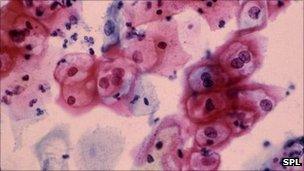Cervical cancer vaccine: NHS choice questioned
- Published

The human papilloma virus can cause cervical cancer and genital warts
The UK government may have chosen the least cost-effective vaccine to immunise teenage girls against viruses that cause cervical cancer, a data study suggests.
In 2008, the Department of Health picked the cheaper of two options - a vaccine called Cervarix.
But the Health Protection Agency (HPA) concludes that a different vaccine, Gardasil, could provide better value.
Cervarix would need to be £19 to £35 cheaper to match Gardasil's payback.
Although it is not known what deal the government was able to strike with GSK, the pharmaceutical company that manufactures Cervarix, the NHS list price for the drug is £80.50 per dose.
In comparison, Gardasil, made by Merck & Co, is £88.50 per dose.
The current tender for the vaccination is due to run out before the end of 2011.
The authors of the study in the British Medical Journal, external stress that "considerable uncertainty" remains about the differential benefit of the two vaccines, and say both are good at cutting human papilloma virus-related cervical cancer rates. And they say it is up to the government to decide which vaccine to buy.
Both vaccines protect against HPV types 16 and 18, which cause more than 70% of cervical cancer cases.
But Gardasil also protects against types 6 and 11, which cause genital warts.
Proponents of Gardasil say this makes it a better choice vaccine because this disease is widespread.
A study, external published earlier this year by Dr Kate Soldan, also of the HPA, and colleagues estimates that genital warts - the most common viral sexually transmitted infection diagnosed in sexual health clinics in England - cost the NHS about £17m a year.
Taking into account this new research and other emerging evidence, the HPA researchers have revised an earlier estimation of the cost-benefits of the two jabs.
When Mark Jit and his colleagues last informed the government back in 2008 as it was deciding which vaccine to plump for, and they suggested that Cervarix would have to be £15 to £23 cheaper per dose to be as cost-effective as Gardasil.
But now they say the difference in price tag is more like £19 to £35.
Up for tender
A Health Protection Agency spokeswoman said: "This study confirms that the national HPV immunisation programme, using either of the available HPV vaccines, is highly likely to offer valuable protection against cervical cancer. This is additional to the considerable benefits provided to women by the National Cervical Screening Programme.
"Deciding which vaccine to use for national immunisation programmes is a complex task. Many factors, including the cost of the vaccine, must be taken in to account.
"The Department of Health will use the results of this study as part of its decision-making process when reviewing its current vaccine choice."
A Department of Health spokesman said discussions about which vaccine to buy in the future were concluding and that "an announcement will be made in due course".
He added: "England has one of the most successful HPV vaccination programmes in the world. We worked closely with the HPA on this study and the findings have fed into discussions around the new vaccine contract."
Meanwhile, new research suggests introducing a test for HPV alongside regular smear tests reduces the number of women needing further investigation by more than a third.
The study, published in the British Journal of Cancer, external, examined more than 10,000 women aged 25 to 64 whose first smear test had shown mild or borderline abnormalities in the cervix.
HPV testing is currently being incorporated into England's cervical cancer screening programme, and will be fully rolled out within the next year.
- Published13 February 2011